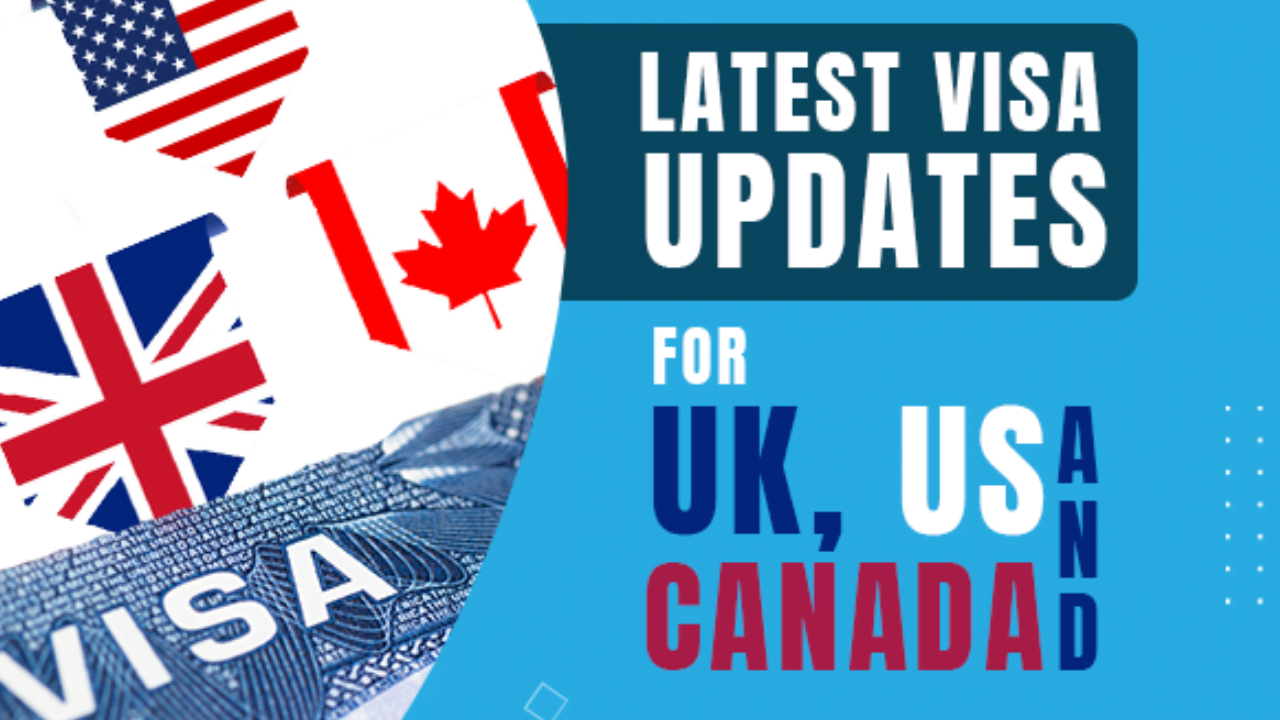Student visas are a pivotal element in the journey of international students aiming to pursue their education overseas. These visas serve as official permits, granting entry into a country for the primary purpose of studying at an accredited institution. Understanding the intricacies of student visas, their procurement processes, and associated requirements is critical for a seamless transition to studying abroad in countries like the UK, USA, and Canada.
Each nation offers its own distinctive pathway for international students, tailored to suit their specific immigration policies. The UK, for instance, requires students to obtain a Tier 4 (General) student visa, while the USA mandates an F-1 visa for those enrolling in academic courses. Canada offers the Study Permit, which similarly functions as a student visa but comes with unique supportive provisions. The overall purpose of these visas spans ensuring compliance with national regulations, maintaining educational standards, and facilitating security protocols.
The processes involved in securing a student visa encompass several stages, including obtaining an acceptance letter from a recognized educational institution, compiling requisite documentation, and demonstrating financial stability to cover tuition fees and living expenses. Furthermore, some countries may necessitate language proficiency tests or medical examinations as part of their evaluation criteria. These nuanced requirements underscore the importance of meticulous planning and timely application submission, which can significantly impact the duration of visa processing and the successful commencement of studies abroad.
The importance of understanding visa requirements extends beyond mere formalities. It acts as a safeguard against potential delays and complications, which could disrupt academic timelines and personal aspirations. Therefore, aspirants are encouraged to familiarize themselves thoroughly with the visa application processes of their chosen destination and adhere to the prescribed timelines. This informed approach not only ensures compliance but also fosters a sense of preparedness, thereby facilitating a smoother transition into the academic and cultural milieu of the host country. View More
Types of Student Visas in the UK, USA, and Canada
When considering international study, understanding the various student visa options is essential. This section provides a detailed overview of the types of student visas available in the UK, USA, and Canada, outlining the eligibility criteria and duration for each.
UK
In the UK, two primary student visa categories stand out: the Tier 4 (General) Student Visa and the Short-term Study Visa. The Tier 4 (General) Student Visa is aimed at students aged 16 and older who wish to enroll in a course lasting more than six months. Eligibility requirements include an offer from a licensed Tier 4 sponsor and proven proficiency in English. This visa allows students to stay for the duration of their course, with possible extensions for further studies or switching to a work visa post-graduation.
The Short-term Study Visa, on the other hand, caters to students participating in courses of six months or less, such as English language programs. This visa does not permit work or extend beyond its initial duration. Applicants must show acceptance into a recognized course and sufficient funds to cover their stay in the UK.
USA
In the USA, three main types of student visas are available: the F-1 Visa, J-1 Visa, and M-1 Visa. The F-1 Visa is the most common, intended for students enrolled in academic programs at colleges, universities, or language training schools. The eligibility criteria include acceptance from a SEVP-approved school and sufficient financial support. F-1 visa holders can stay for the duration of their studies, with opportunities for Optional Practical Training (OPT) post-graduation.
The J-1 Visa is designated for exchange students participating in programs promoting cultural exchange, which might include high school or college study. The J-1 Visa often involves a work or internship component. Students need program sponsorship and agreement to fulfill the exchange purpose.
The M-1 Visa targets students in vocational or non-academic programs. It covers technical courses and training schools, requiring evidence of admission and resources to support the entire stay. M-1 Visas are issued for a fixed tenure linked to the course’s duration, with limited extensions.
Canada
In Canada, the primary form of student authorization is the Study Permit. While not technically a visa, it allows students to study at designated learning institutions (DLIs). Applicants must present an acceptance letter from a DLI, proof of financial support, and meet health and security standards. The Study Permit typically remains valid for the course length, with a possible 90-day grace period afterward for preparation to leave or extension for further education.
Variations of the Study Permit include permits for primary/secondary school students and entrance to certain preparatory programs before full-time studies. These permits aim at easing transitions and providing children with early education opportunities within Canada.
Understanding these student visa categories and their specific requirements is fundamental for any international student’s academic aspirations. Choices must align with academic goals and personal circumstances to ensure a smooth application process and successful study abroad experience.
Eligibility Requirements

To successfully obtain a student visa for the UK, USA, or Canada, applicants must meet a set of specific eligibility requirements. These criteria primarily encompass academic qualifications, proof of acceptance to a recognized educational institution, language proficiency, financial capability, and, in some cases, health examinations and police clearances.
Academic Qualifications and Proof of Acceptance
Each country expects applicants to demonstrate an appropriate level of academic achievement. Generally, students must provide transcripts and certificates from their previous educational institutions. Additionally, a key requirement common to the UK, USA, and Canada is the acceptance letter from a recognized educational institution. This serves as proof that the applicant has been admitted to a full-time course of study.
Language Proficiency Tests
Language proficiency is another crucial aspect of the eligibility criteria. For the UK, candidates must usually provide results from an English language test approved by UK Visas and Immigration (UKVI), commonly the IELTS. Similarly, the USA and Canada often require scores from standardized English language tests such as the TOEFL or IELTS. These tests assess the applicant’s ability to read, write, speak, and comprehend English, ensuring they can succeed in an English-speaking academic environment.
Financial Capability
Demonstrating financial capability is essential when applying for a student visa. Authorities in the UK, USA, and Canada require applicants to provide proof that they can support themselves during their stay. This involves showing bank statements, scholarship letters, or financial affidavits. The specified amount varies, covering tuition fees and living expenses.
Health Examinations and Police Clearances
In some cases, applicants may need to undergo health examinations and provide police clearances. For instance, the UK may request a Tuberculosis test, depending on the applicant’s country of residence. The USA requires a health check, including vaccinations, while Canada may demand a medical examination for longer study programs. Police clearance certificates might be required to establish the applicant’s good character and ensure they do not have a criminal background.
Understanding these eligibility requirements is fundamental for prospective international students. Meeting these criteria increases the likelihood of a successful student visa application for the UK, USA, or Canada.
Application Process
Navigating the application process for student visas in the UK, USA, and Canada requires meticulous preparation and adherence to specific guidelines. Each country has distinct requirements, but they share some common procedures.
For the UK, aspiring students must apply for a Tier 4 (General) student visa if they are aged 16 or older. The application begins by obtaining a Confirmation of Acceptance for Studies (CAS) from a licensed sponsor, typically a university. The application can be made up to six months before the course start date, and it’s crucial to apply early to mitigate any unforeseen delays. Required documents include a valid passport, proof of funds, and evidence of English language proficiency. The application fee is approximately £348, and processing times can vary but generally take around three weeks.
In the USA, the first step involves acceptance into a Student and Exchange Visitor Program (SEVP)-certified school, which then provides a Form I-20. The next step is to pay the SEVIS fee and complete the DS-160 form online. Required documents include a valid passport, Form I-20, DS-160 confirmation page, and a passport-sized photo. An interview at the U.S. embassy or consulate is mandatory, where additional documents such as financial proof and academic records may be requested. The visa application fee is $160, with processing times varying from several days to a few weeks.
Canada’s process entails applying for a study permit after receiving an acceptance letter from a Designated Learning Institution (DLI). The application can be submitted online or via paper to Immigration, Refugees, and Citizenship Canada (IRCC). Key documents include a passport, proof of sufficient funds, and a letter of acceptance. In some cases, applicants may need to undergo a medical exam and provide a police clearance certificate. The application fee for a study permit is CAD $150, and processing times range from three to 16 weeks depending on the applicant’s country of residence.
Early application is fundamentally crucial to account for possible delays and ensure timely preparation for travel and settlement. While the core requirements across these countries involve proof of academic eligibility, financial stability, and identification, nuanced differences such as specific forms, interview requirements, and processing times highlight the necessity of understanding each country’s unique procedural demands.
Interview and Documentation

Securing a student visa necessitates thorough preparation, especially when it comes to the interview and requisite documentation. Among the three countries under consideration—the UK, USA, and Canada—the United States generally mandates an in-person interview as a critical component of the visa application process. Understanding what to expect and how to prepare can substantially impact the outcome.
For a smooth interviewing process, applicants should gather and organize several essential documents. First and foremost, a valid passport is necessary, which should remain valid for at least six months beyond the intended duration of stay. Financial statements are also crucial, providing evidence of sufficient funds to cover tuition and living expenses. Acceptance letters from accredited educational institutions, including details of the program and its duration, must be clearly presented.
Another vital document is proof of English language proficiency, typically validated through standardized tests such as IELTS or TOEFL. These certificates not only assist in visa approval but are also integral to admission processes in most universities.
When preparing for the visa interview, the emphasis should be on authenticity and accuracy. Applicants can benefit from rehearsing potential questions, focusing on their study plans, the choice of institution, and future career aspirations. Common questions might include reasons for selecting a particular course or university and how the applicant plans to finance their education. Providing consistent and truthful responses enhances credibility and builds trust.
It is equally important to demonstrate a clear understanding of one’s academic and career goals, as visa officers often evaluate the applicant’s intent and potential to contribute positively to their home country upon completion of their studies. A composed demeanor, punctuality, and professional appearance can further augment the applicant’s profile during the interview.
In conclusion, mastering the interview and documentation intricacies for student visas requires meticulous preparation and authenticity. By gathering the necessary documents, understanding the potential questions, and responding honestly, applicants can navigate this critical step with confidence.
Post-Visa Approval: Next Steps
Once your student visa for the UK, USA, or Canada is approved, it marks the beginning of an exciting yet challenging journey. Proper planning post-visa approval can facilitate a smooth transition to your new life abroad. Key elements include travel arrangements, securing accommodation, attending orientation sessions, and preparing for cultural adjustments.
First and foremost, finalize your travel plans. Booking a flight early can often yield better prices and more convenient options. Make sure your travel documents, including your passport and visa, are secure and accessible. It is also wise to have a copy of your visa approval and admission letter to present to immigration officials upon arrival.
Accommodation is another critical consideration. Many universities offer on-campus housing, which can ease the transition and help you quickly integrate into campus life. For those opting for off-campus living, researching safe neighborhoods near your institution and understanding the local rental market will be crucial.
Orientation sessions provided by your university are invaluable. These sessions offer extensive information on academic expectations, campus resources, and social opportunities, helping international students acclimatize to their new environment. Attending these orientations can also be a prime opportunity to meet fellow students and establish initial social connections.
In terms of packing, it’s important to bring essential items while being mindful of baggage restrictions. Important documents, clothing suitable for varying weather conditions, and personal electronics should all be packed. Consider bringing familiar items that provide comfort and remind you of home, which can be particularly helpful when coping with homesickness.
Cultural adjustments can be daunting. It is advisable to learn about the social norms, laws, and customs of your host country. Engaging in local activities and being open to new experiences can help ease this transition. Equally important is understanding the healthcare system in your new country. Securing health insurance is mandatory and can safeguard against unexpected medical expenses.
Successfully adapting to a new country also involves emotional resilience. Stay connected with family and friends back home via video calls and social media, and be patient as you navigate this significant life change. Many universities offer counseling services, which can be a great resource for managing stress and anxiety.
Maintaining Visa Status
Upon securing a student visa for studying in the UK, USA, or Canada, adhering to the conditions stipulated in your visa status is paramount. Failure to comply with these requirements can lead to grave implications, including deportation or difficulties in obtaining visas in the future. Understanding the responsibilities associated with maintaining your visa status is essential.
Working While Studying
International students often seek part-time employment to supplement their finances. However, it is vital to be aware of the specific regulations in your host country. In the UK, for instance, students may work up to 20 hours per week during term time if their visa permits it. In the USA, students on F-1 visas are generally restricted to on-campus employment for a maximum of 20 hours per week during the academic semester. Canadian student visa holders may work up to 20 hours per week off-campus during regular academic sessions. Exceeding these hourly limits can jeopardize your visa status and may lead to serious repercussions.
Attendance Requirements
Maintaining regular attendance and good academic standing is crucial. Most institutions monitor attendance and academic performance closely. Falling short in these areas may not only affect your academic progress but may also be reported to immigration authorities, potentially leading to visa cancellation. Ensuring consistent attendance and satisfactory academic performance is key to maintaining your student visa status.
Reporting Changes in Personal Circumstances
Your visa status may also be affected by changes in your personal circumstances, such as marriage, change of address, or a shift in your academic program. Promptly reporting these changes to the relevant authorities is essential. In the UK, students must inform the UK Visas and Immigration (UKVI). In the USA, changes should be reported to the Designated School Official (DSO). In Canada, updates should be communicated to the Immigration, Refugees and Citizenship Canada (IRCC).
Extending or Changing Visa Status
There might be situations requiring the extension of your student visa or changing your visa status. In such cases, it is crucial to begin the application process well before the expiration of your current visa. Each country has its specific procedures: in the UK, this is done through the UKVI; in the USA, through the United States Citizenship and Immigration Services (USCIS); and in Canada, through the IRCC. Adhering to the timelines and following the correct procedures ensures a seamless transition without any legal complications.
In conclusion, maintaining your student visa status involves diligent adherence to the regulations concerning work, attendance, and personal circumstances. By staying informed and proactive, international students can enjoy a successful academic journey in their host country without visa-related disruptions.
Transitioning to Permanent Residency or Work Visas
For international students who wish to extend their stay in the UK, USA, or Canada after completing their studies, each country offers distinct pathways to transition from student visas to work permits or permanent residency. Making this transition requires a clear understanding of the eligibility criteria, application processes, and associated deadlines.
In the UK, the primary route to remain in the country post-graduation is through the Graduate Route visa. This allows graduates to work or seek employment for up to two years (three years for PhD graduates). Candidates can switch to skilled work visas if they secure a qualifying job offer from a recognized sponsor. Long-term residency may eventually be pursued through the Indefinite Leave to Remain (ILR), contingent on factors such as continuous residency and meeting specific income thresholds.
The USA offers the Optional Practical Training (OPT) program, which grants F-1 visa holders up to 12 months of employment authorization in their field of study, with extensions available for STEM graduates. Post-OPT, individuals might transition to H-1B visas, a non-immigrant work visa for specialized occupations. The H-1B visa is often a springboard to permanent residency through employer sponsorship, typically via the employment-based green card application process.
Canada provides the Post-Graduation Work Permit (PGWP), allowing students to work for up to three years post-graduation, depending on the length of their study program. Experience gained during this period can be integral to qualifying for permanent residence through programs such as the Canadian Experience Class (CEC) under the Express Entry system. Other provincial nominee programs (PNPs) also offer pathways based on job offers, work experience, and education.
While these pathways present significant benefits, including the potential for long-term career growth and permanent residency, they also come with challenges. Applicants must navigate complex bureaucratic processes, meet stringent eligibility requirements, and adhere to varied timelines. Successfully managing this transition demands thorough preparation and often the support of legal or immigration consultants. Nonetheless, for many students, these pathways offer valuable opportunities to build a future in their chosen country.
Conclusion
Navigating the student visa process can be complex, but it is essential for pursuing education abroad. By understanding the requirements and preparing in advance, students can make the transition smoother and focus on their academic goals. If you have specific questions or need assistance, it’s advisable to consult the official immigration website or a qualified immigration advisor.
If you have any questions or concerns about our Article, please reach out to our support team. We’re here to help you!










Hello, useful information and great site, thank you very much
Thank you very match
This article on Student Visa Requirements for the UK, USA, and Canada provides clear and essential information for prospective international students.
Good site
You are doing very hard work bro.
Hi
nice
Nice topic for students
Nice topic bro
Thank you for helping out, great info. “The laws of probability, so true in general, so fallacious in particular.” by Edward Gibbon.
It’s in point of fact a great and helpful piece of info. I’m glad that you simply shared this useful information with us. Please stay us up to date like this. Thank you for sharing.
You made some nice points there. I did a search on the issue and found most guys will go along with with your blog.